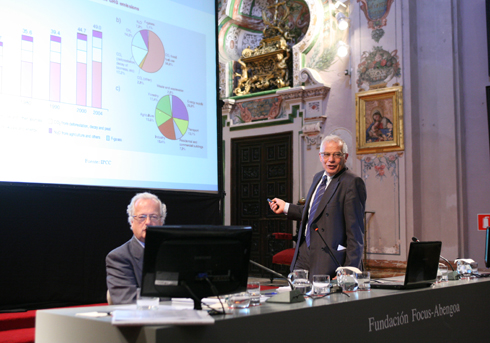 Abengoa
Abengoa
Annual Report 2010
- Corporate Social Responsibility Report
- Abengoa and the Community
- Training, Research and Dissemination of Knowledge
Abengoa, fully aware of the importance of educating today’s generations for the benefit of future society, creates and promotes a variety of programs to promote quality training and education for everyone. The company acts through the Focus-Abengoa Foundation to support research by creating and promoting a host of different artistic, cultural and environmental research programs.
Forum on Energy and Climate Change
The Focus-Abengoa Forum on Energy and Climate Change relies on public debate to create an open platform from which to investigate, showcase and address ideas and results. The Focus-Abengoa Foundation contributes to the debate on changes to the energy model, thereby supporting Abengoa’s business endeavors. It achieves this through a multidisciplinary approach that tackles both technological and economic factors involving the utilization of clean energy sources, as well as institutional and political mechanisms that encourage users and producers to make decisions compatible with a sustainable energy model.
Under the umbrella of the Focus-Abengoa Forum on Energy and Climate Change, Abengoa organizes and promotes company-specific initiatives and all manner of collaborations with other institutions, whether these belong to the business world, such as the Fundación de Estudios de Economía Aplicada; universities, such as Universidad Internacional Menéndez Pelayo; research centers, or, in general, any other entity related to the interests of the forum.
Further information on the activities under way can be found on the forum’s website: www.energiaycambioclimatico.com.
The aim of the program, which was created in collaboration with the Fundación de Estudios de Economía Aplicada (Fedea), is to encourage and foster debate and research in relation to the following subjects through working groups comprising both economists and scientists:
- Efficient use of energy sources.
- Innovation in renewable energy sources.
- The effects of these processes on the environment and the economy.
The benchmark is the SET (Sustainable Energy Technology) report on these issues, which is organized into two areas: Technical efficiency and economic efficiency. Other noteworthy objectives of this program include brainstorming ideas and disseminating results, in both the national and international academic realms, as well as among experts and negotiators in the area of economic policy.
The SET on technical efficiency (SET_TE) was formed from other reports on the current state of those technologies that might have the greatest bearing on the energy model and those best suited to the fight against climate change. These reports have been verified by experts from the different areas in play and will be published as part of the SET Report.
The SET on economic efficiency (SET_EE) analyzes advancements in energies within the different countries and regions for the various technologies, while describing changes in CO2 emissions. The economic SET is accompanied by an analytical study on how energy production costs have evolved (long-term international trends), in addition to a bulletin addressing the energy situation for Spain (short-term).
The overarching aim of the research program is to generate and promote energy research, and to publish the results in leading academic magazines.
In relation to the technological arm of the research program, nine articles on a variety of different energy-related subjects were published between 2008 and 2010.
Similarly, and with regards to the economic arm of the program, various articles have been published in a number of top-tier magazines, including Energy Economics, Sustained and Renewable Energy Review and Economía Industrial.
World Biofuels 2010
Abengoa, in collaboration with F.O. Licht, staged the ninth World Biofuels 2010 conference at the Hospital de los Venerables church. The conference was split into three sessions, namely “Biofuels and Sustainability”, “The Globalization of Biofuel Markets” and “Development of the Second-Generation Biofuels Industry”. The talks addressed biofuel sustainability, including the verifications and checks required to ensure such sustainability; the globalization of biofuel markets; the associated raw materials, and the state-of-the-art in relation to conversion technologies, which must serve to popularize second-generation biofuels.
VII Javier Benjumea Puigcerver Prize for Research
The Social Council of Seville University and the Focus-Abengoa Foundation created a Prize for Research in 2003 in commemoration of Javier Benjumea Puigcerver, the founder of Abengoa and the Abengoa Foundation.
This year round, the accolade was handed to Miguel Ángel García Guerrero, a tenured professor of biochemistry at Seville University, in recognition of his work titled “Development of microalgae-based industrial, energy and environmental processes”.
The winning research entry for 2009 was also published: “Study into damage mechanisms within compound materials”, by Federico París Carballo.
II Alfonso E. Pérez Sánchez International Award
The Alfonso E. Pérez Sánchez International Award was created in 2009 in order to stimulate research into the hitherto less explored facets of Spanish art, and to raise awareness of Velázquez and the Seville of his era. Now in its second year, the accolade for 2010 was awarded to Luis Méndez Rodríguez, for his work entitled “Sevilla 1533. La aventura de Jerónimo Köler” (Seville 1533. The Adventure of Jerónimo Köler).
Professor Alfonso E. Pérez Sánchez was involved with the foundation since its inception and was responsible for designing the master lines as part of the foundation’s artistic and heritage-related activities.
VII School of the Baroque
In November of 2010, Abengoa, in collaboration with Universidad Internacional Menéndez Pelayo (UIMP), staged the seventh edition of the School of the Baroque under the title “The power of the image: Portraits of the Baroque city”. The 2010 edition tackled the subject of urban landscapes or views, an artistic field deeply rooted in classical and medieval schools but which truly flourished during the Baroque era.
Headed by Richard L. Kagan of Johns Hopkins University, Baltimore, the school has a truly international vocation and features numerous experts from both Spanish and international institutions, as well as university students and interested members of the public.
Specialists in urban history, art history and architecture, explore the subject of urban representations over the modern era, not only in Seville, Madrid and Spain in general, but also in countries and regions such as Italy, the Netherlands, Latin America and the Middle East.
Vuela Program for Children of Abengoa Employees
The Vuela Program is an initiative that started life in 2008 with the aim of giving the children of company employees the chance to gain first-hand knowledge of the company where their parents work, while offering them their first work experience within a leading company in the field of sustainable development, and affording them the opportunity to get to know a different country and culture than their own.
In 2010, 13 Vuela Program grants were awarded in the winter and summer groups to beneficiaries from Europe, Latin America and North America.
Training Program for the Disabled
For the fourth year in a row, Abengoa, in collaboration with the Department for Employment of the Regional Government of Andalusia and the Safa foundation (Escuelas Profesionales Sagrada Familia), staged a training program for disabled people, subsidized by the European Social Fund.
Abengoa has undertaken to hire, for a six-month term, at least 60% of those students that successfully complete the program.
With a view to creating jobs and ensuring equal access to the labor market, the company has reached agreements with numerous leading bodies and organizations for the disabled.The Abengoa Foundation is taking part in the “Inserta” project. Spearheaded by Seville University, the initiative aims to help disabled people find employment and to broaden their chances of success within the job market.

The Focus-Abengoa Scholarship Program
In 2010, a total of 165 scholarship recipients took part in the Focus-Abengoa scholarship program, funded through educational cooperation agreements that the foundation has undertaken with a variety of Spanish and international academic institutions.
The cost of the 2010 Abengoa scholarship program totaled €1.3 M.


School of Energy and Climate Change
The month of April witnessed the VI edition of the School of Energy and Climate Change, organized by the Focus-Abengoa Foundation and Universidad International Menéndez Pelayo (UIMP) under the title “The new economic scenario: Emissions market”.
The person in charge of the 2010 edition was Cristina Narbona, Spanish ambassador to the Organisation for Economic Co-operation and Development (OECD). The event was opened at Hospital de los Venerables, the headquarters of the Focus-Abengoa Foundation.
The opening talk was given by Joseph Borrell, President of the European University Institute, who tackled a hugely topical issue: “The European Union and climate change”.
A number of widely renowned and respected Spanish and international academics, along with prominent political figures and key members of leading sustainability companies, all analyzed, along with UIMP students, the economic implications of controlling emissions. They also addressed institutional issues and conducted an analysis of the prevailing international stance on environmental policy.
The following speakers took part in the event: Cristina Narbona; Joseph Borrell; Laura Cozzi, of the International Energy Agency; Santiago Rubio, tenured professor of economics at Universidad de Valencia and winner of the 2009 Lucas Mallada Spanish National Economics and Environment Award; Gustavo Marrero, of the Focus-Abengoa/Fedea research project and lecturer at Universidad de La Laguna; Rob Dellink, analyst of modeling policies for the OECD environment committee; Emilio Rodríguez-Izquierdo, Managing Director of Zeroemissions; Manuel Marín, Chairman of the Iberdrola Foundation; Frank Convery, Head of the Earth Sciences Institute at University College (Dublin) and honorary president of the European Association of Environmental and Resource Economists; and Teresa Ribera, Secretary of State for Climate Change, who also gave the closing speech.

The school looked into the main measures adopted around the world to keep contamination in check, with particular attention paid to the corporate vision and responses of those companies most heavily involved in this new challenge. The speakers then discussed new outlooks in terms of international coordination stemming from the Copenhagen Summit.
Event participants paid two visits, the first to Campus Palmas Altas, Abengoa’s corporate headquarters, where Cristina Narbona gave her speech on “Instruments for international coordination in the fight against and adaptation to climate change”, and the second to the Solúcar solar platform in Sanlúcar la Mayor (Seville).
